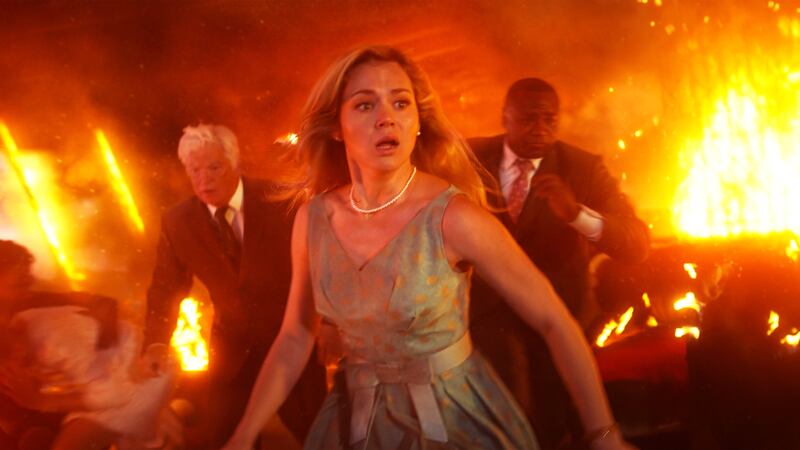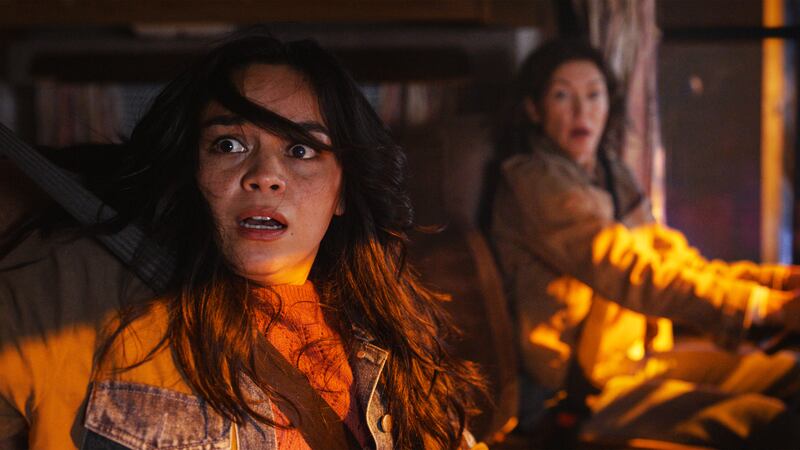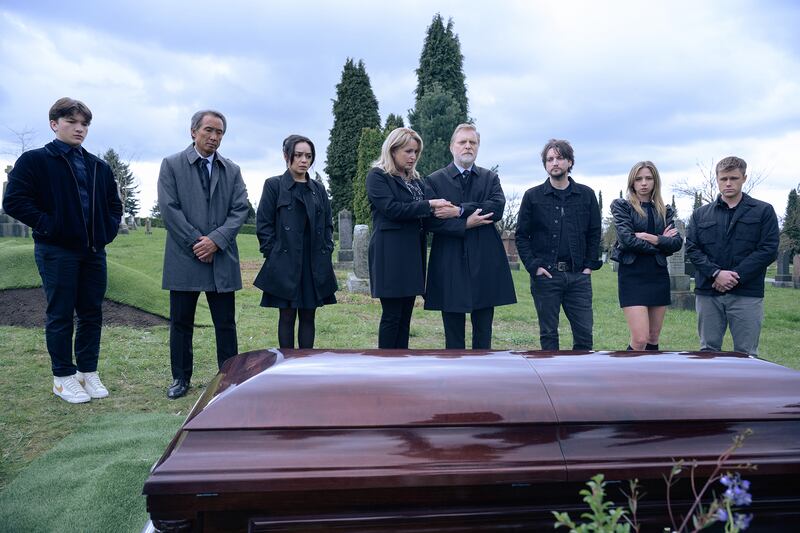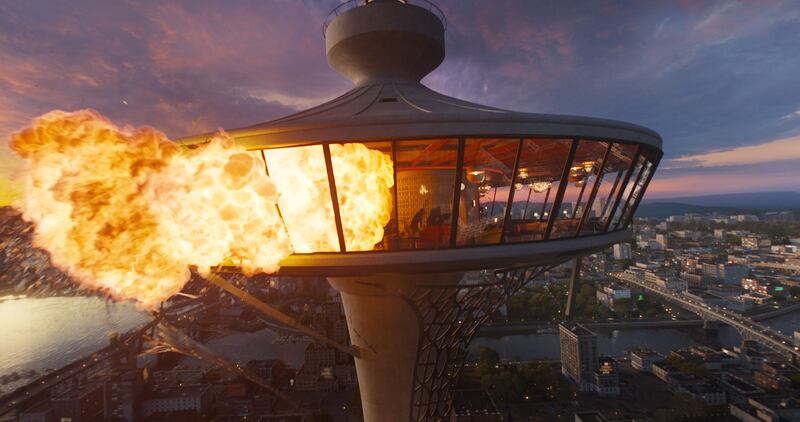The Final Destination franchise has always demanded tremendous suspension of disbelief.
It asks viewers to accept that Death is not just an invisible force (versus a physical entity), but one that can kill its prey solely through elaborate Rube Goldberg-like cause-and-effect accidents—rather than by, say, immediately striking them down with lightning or having the ground beneath their feet give way.
It imagines the Grim Reaper as a clownishly powerless specter that can only do its job via the most convoluted means conceivable, and that tack continues with Final Destination Bloodlines, a sixth installment, now in theaters, that concerns doomed kids trying to escape overly complicated plans whose prime inspiration seems to be the classic board game Mouse Trap.
Few horror series boast less internal logic than Final Destination, whose rules don’t hold up to the slightest scrutiny, and that remains true with Bloodlines.

As befitting its predecessors’ lack of attention to detail, Zach Lipovsky and Adam Stein’s sequel opens in an unspecified 1960s locale where Iris (Brec Bassinger) and Paul (Max Lloyd-Jones) attend the grand opening of the Skyview Tower, whose restaurant provides a vertiginous view of the surrounding area.
Iris reacts nervously to every little thing that happens around her, all of which is depicted with italicized ominousness. It’s not long before random incidents—a penny caught in a ventilator fan; a glass dance floor cracking under the weight of revelers; bolts flying out of support beams—conspire to create catastrophe, with everyone ultimately plummeting to their deaths, including Iris and Paul, who moments earlier had gotten engaged after Iris revealed that she was pregnant.
Bloodlines’ opener strives for cleverness but its deadly domino-effect structure is so tired that it fails to surprise. There’s similarly no shock to learn that it’s not real; instead, it’s a recurring dream that’s plaguing college student Stefani (Kaitlyn Santa Juana).
Since Iris is the name of Stefani’s estranged grandmother, she heads home to research the woman. There, she’s greeted warmly by dad Marty (Tinpo Lee) and given the cold shoulder by brother Charlie (Teo Briones), who blames her for ignoring him in the same way that their mom Darlene (Rya Kihlstedt) abandoned them years earlier. Pressing her uncle Howard (Alex Zahara) doesn’t get her anywhere, although her aunt Brenda (April Telek) tips her off to Iris’ location—a remote woodland cabin that, Stefani discovers, is shielded by castle-like defenses.

After cautiously letting Stefani into her makeshift fortress, Iris (Gabrielle Rose) relays that Stefani’s dream is actually the exact same premonition she had all those many years ago—a vision that allowed her to save the Skyview gala’s attendees from their dire fate.
Bloodlines never explains why Iris received this magical forewarning, nor why Stefani would begin experiencing it once Iris heard that she was dying of cancer; it’s just one of many plot points that Guy Busick and Lori Evans Taylor’s script (based on a story by Jon Watts) expects audiences to accept without a thought.
Iris tells Stefani that, for the past six decades, Death has killed everyone who was supposed to perish in the Skyview calamity, as well as their offspring. Recognizing that Stefani is next on the kill list (apparently, Death works slowly when it comes to make-up slayings), the grandma gives the girl a handy manual on avoiding Death before suffering a predictably gruesome end.
Stefani thus endeavors to protect her loved ones, who naturally don’t buy what she’s selling—at least until Howard gets a lawnmower to the face in a sequence that has plentiful complications and fake-outs but little invention.

Worse, Bloodlines doesn’t have the courage of its own ghastly convictions, cutting away swiftly from Howard’s fate and setting up a should-be gnarly scene—in which cousin Erik (Richard Harmon), at his tattoo parlor, gets his nose ring caught in a chain that’s coiling around a ceiling fan—and then skirting the teased payoff. The rest of the film’s fatalities are of a ho-hum variety, orchestrated with by-the-numbers cheekiness and undercut by annoying characters who aren’t missed once they’re gone.
Stefani eventually tracks down Iris’ foreboding buddy William Bludworth (Tony Todd), who fills in the requisite procedural gaps for the heroine, making clear that cheating Death is doable by either killing someone (which grants the murderer their victims’ remaining years) or dying and being resuscitated, which breaks the cursed chain.

Doing the latter is the lone legitimate option for these goody-goodies, and harder than it sounds, as proven by a prolonged bit in a hospital where nut allergy-afflicted cousin Bobby (Owen Patrick Joyner) tries to end his life and, for his troubles, winds up suffering nastiness in a magnetized MRI room. In this and other set pieces, Lipovsky and Stein’s attempts at misdirection fall flat, both because they’re obvious and because the franchise dictates that, at best, merely one or two fortunate souls will survive.
“When you f— with Death, things get messy,” intones Bludworth, and that notion extends to Final Destination Bloodlines itself, whose every perilous step is sloppy. Lipovsky and Stein elicit not a single solid performance from their cast, and their tale’s twists are illogical even by the material’s established guidelines.

Stefani sees the future when it’s narratively convenient and is blind to what’s coming when it’s not, and the proceedings’ shortcuts progressively mount until everything feels as shaky as the giant backyard Jenga game enjoyed by Stefani’s barbequing family. In his portentous cameo, the late Todd reminds viewers why he was a genre icon. Otherwise, though, the film is inert, regardless of the fact that it’s chockablock with crises initiated by items falling down, tipping over, and bumping into each other.
From the start, the Final Destination movies have been a cute idea incapable of supporting a feature-long story, much less an extended mythology, and Bloodlines is no different. Stefani’s quest to maintain her (and her relatives’) pulse is marked by the usual array of near misses and splattery casualties, all of them the result of intricate ruses that make Death come across as a feeble lame-o that smites through silliness. Uninterested in being scary, it’s just a cartoonish rollercoaster ride devoid of a genuinely sick sense of humor.
The post ‘Final Destination’ Franchise Should Be the Next One Brutally Killed appeared first on The Daily Beast.




